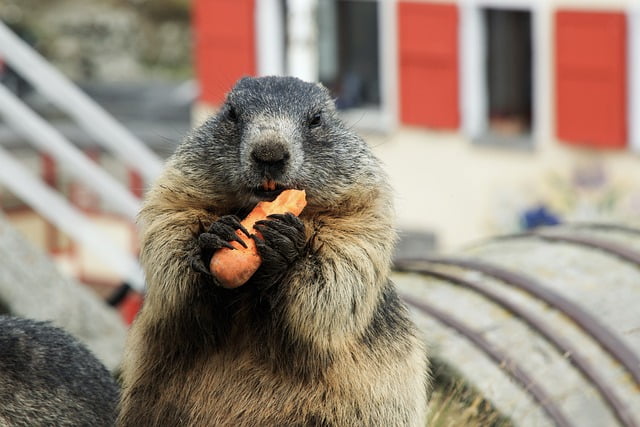
[ad_1]
Looking for a furry friend to add to your family? Look no further! In this article, we will be discussing the benefits of having a pet marmot as well as where you can find marmots for sale. Marmots are adorable creatures that make wonderful companions and can bring joy and excitement to your home. Read on to learn more about these furry friends and how you can bring one home today!
Why should I consider getting a pet marmot?
Marmots are highly social animals that thrive on companionship. They are known for their playful and curious nature, making them a fun and entertaining pet to have around. Marmots are also relatively low-maintenance pets, requiring basic care such as a proper diet, plenty of space to roam and play, and regular veterinary check-ups. Additionally, marmots can form strong bonds with their owners and enjoy cuddling and receiving affection.
If you are looking for a unique and lovable pet that will bring a smile to your face, a marmot may be the perfect choice for you. With their cute faces and quirky personalities, marmots can quickly become a beloved member of your family.
Where can I find marmots for sale?
Marmots are not as common as other pets such as dogs or cats, but they can still be found for sale through exotic pet breeders or online marketplaces. Before purchasing a marmot, it is essential to research the breeder or seller to ensure they are reputable and ethical. Make sure to inquire about the marmot’s health history, living conditions, and any necessary paperwork or permits required for ownership.
It is also crucial to consider the long-term commitment of owning a marmot, as they can live up to 15 years in captivity. Make sure you are prepared to provide a safe and loving environment for your marmot for the duration of their life.
How can I care for my pet marmot?
Caring for a pet marmot involves providing them with a balanced diet, plenty of space to exercise and explore, and regular veterinary check-ups. Marmots are herbivores and should be fed a diet consisting of fresh fruits and vegetables, hay, and small amounts of pellets formulated for rodents. It is essential to monitor their food intake to prevent obesity and other health issues.
Marmots are active animals that require ample space to run, climb, and play. Providing them with a large enclosed outdoor area or a spacious indoor enclosure with tunnels, ramps, and hiding spots will help keep them happy and healthy. Regular interactions with your marmot, such as playing with toys or grooming them, will also strengthen your bond and ensure their well-being.
Can marmots be trained?
While marmots are intelligent animals, they are not typically trained in the same way as dogs or cats. However, marmots can learn basic commands and behaviors through positive reinforcement training. Using treats and praise to reward good behavior can help shape your marmot’s actions and strengthen your bond with them.
It is essential to be patient and consistent when training your marmot, as they may take longer to learn compared to other pets. With time and dedication, you can teach your marmot to respond to their name, come when called, and engage in interactive play.
Are marmots good pets for children?
Marmots can make wonderful pets for families with children, as they are gentle and sociable animals that enjoy interaction and play. However, it is essential to supervise young children around marmots to ensure their safety and well-being. Teaching children how to handle and care for their pet marmot responsibly will help foster a positive relationship between them.
Before bringing a marmot into a household with children, it is important to educate them about marmot behavior, needs, and boundaries. By involving children in the care and interactions with the marmot, they can learn valuable lessons about empathy, responsibility, and respect for animals.
When a marmot is a pet, you can relax with it
Conclusion
In conclusion, marmots make fantastic pets for individuals and families looking to add a furry friend to their home. With their playful personalities and adorable looks, marmots can bring joy and companionship to your life. By providing them with proper care, love, and attention, you can enjoy a long and rewarding relationship with your pet marmot.
FAQs
1. Can marmots be potty trained?
While marmots are naturally clean animals, it can be challenging to potty train them like other domestic pets. It is essential to provide your marmot with a designated bathroom area in their enclosure and to clean it regularly to encourage good habits.
2. Do marmots hibernate?
Yes, marmots are known for their hibernation habits during the winter months. It is important to provide a safe and comfortable environment for your marmot to hibernate, with plenty of bedding and insulation to keep them warm.
3. How big do marmots get?
Marmots can vary in size depending on the species, but most pet marmots will grow to be around 20 to 30 inches long, including their tails. It is essential to provide them with a large enough enclosure to accommodate their size and allow for proper exercise.
4. Are marmots social animals?
Yes, marmots are highly social animals that thrive on companionship and interaction with their owners. They enjoy playing, exploring, and receiving attention, making them wonderful pets for those looking for a furry friend.
5. Do marmots make noise?
Marmots are known for their vocalizations, which can include chirping, whistling, and barking sounds. These noises are a natural part of their communication and behavior, so it is essential to understand and respond to their vocal cues to ensure their well-being.
[ad_2]
